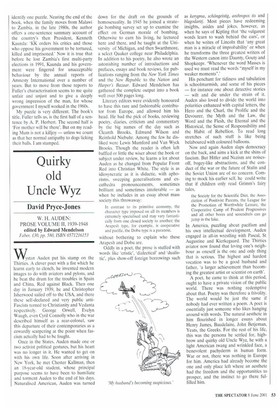Quirky old Uncle Wyz
David Pryce-Jones
W. H. AUDEN: PROSE VOLUME II, 1939-1948 edited by Edward Mendelson Faber, £30, pp. 580, ISBN 0571216153 Wstan Auden put his stamp on the Thirties. A clever poet with a fist which he learnt early to clench, he invented modern images to do with aviators and pylons, and he beat the drum for the troubles in Spain and China, Red against Black. Then one day in January 1939, he and Christopher Isherwood sailed off to the USA, and there these self-declared and very public antiFascists turned to Christianity and Vedanta respectively. George Orwell, Evelyn Waugh, even Cyril Connolly who in the war described himself as a rear-colonel, saw this departure of their contemporaries as a cowardly scarpering at the point when fascism actually had to be fought.
Once in the States, Auden made one or two activist political gestures, but his heart was no longer in it. He wanted to get on with his own life. Soon after arriving in New York, he met Chester Kallman, then an 18-year-old student, whose principal purpose seems to have been to humiliate and torment Auden to the end of his days. Naturalised American, Auden was turned
down for the draft on the grounds of homosexuality. In 1945 he joined a strategic bombing survey set up to examine the effect on German morale of bombing. Otherwise to earn his living, he lectured here and there, and he taught at the University of Michigan, and then Swarthmore, a select Quaker college near Philadelphia. In addition to his poetry, he also wrote an astonishing number of introductions and prefaces, essays and book reviews, for publications ranging from the New York Times and the New Republic to the Nation and Harpers Bazaar. Edward Mendelson has gathered the complete output into a book well over 500 pages long.
Literary editors were evidently honoured to have this rare and fashionable contributor from Europe, and allowed him his head. He had the pick of books, reviewing poetry, diaries, criticism and commentary by the big names of the day such as Cleanth Brooks, Edmund Wilson and Reinhold Niebuhr. Among the few he disliked were Lewis Mumford and Van Wyck Brooks. Though the reader is often left baffled or little the wiser about the book or subject under review, he learns a lot about Auden as he changed from Popular Front Red into Christian White. The style is as idiosyncratic as it is didactic, with aphorisms, sweeping generalisations and excathedra pronouncements, sometimes brilliant and sometimes intolerable — as when he includes in an essay about mass society this throwaway:
In contrast to its primitive economy, the character type imposed on all its members is extremely specialised and may vary fantastically from one closed society to another; the Arapesh type, for example, is cooperative and pacific, the Dobu type is a paranoic,
without bothering to explain who these Arapesh and Dobu are.
Oddly in a poet, the prose is stuffed with words like 'eristic', 'dialectical' and 'dualistic', plus show-off foreign borrowings such
as ketygma, schiingeistig, anthropos tis and blagodaritj. Most pieces have redeeming insights, asides and jokes, however, as when he says of Kipling that 'the vulgarest words learn to wash behind the ears', or when he writes of Lincoln that 'any great man is a miracle of improbability' or when he transforms the three greatest writers of the Western canon into Daunty, Gouty and Shopkeepr. 'Whenever the word Masses is used we must read the words "myself in my weaker moments":
His penchant for tidiness and tabulation is schoolmarmish, and some of his pieces — for instance one about detective stories — wilt and die under the strain of it. Auden also loved to divide the world into polarities enhanced with capital letters, the Hero and the Churl, the Prolific and the Devourer, the Myth and the Law, the Word and the Flesh, the Eternal and the Historical, the Sense of Responsibility and the Habit of Rebellion. To read long stretches of such stuff is like being belaboured with coloured balloons.
Now and again Auden slaps democracy on the back, and aims a kick at the shins of fascism. But Hitler and Nazism are noisesoff, bogey-like abstractions, and the conduct of the war or the future of Stalin and the Soviet Union are of no concern. Coming to mock his earlier self, he could write that if children only read Grimm's fairy tales,
the Society for the Scientific Diet, the Association of Positivist Parents, the League for the Promotion of Worthwhile Leisure, the Cooperative Camp of Prudent Progressives and all other bores and scoundrels can go jump in the lake.
In America, puzzling about pacifism and his own intellectual development, Auden engaged in all-in wrestling with Pascal, St Augustine and Kierkegaard. The Thirties aviator now found that loving one's neighbour as oneself is the one and only thing that is serious. The highest and hardest vocation was to be a good husband and father, 'a larger achievement than becoming the greatest artist or scientist on earth'.
A poet, he came to think at this period, ought to have a private vision of the public world. There was nothing redemptive about that. Poetry was therefore a frivolity. The world would be just the same if nobody had ever written a poem. A poet is essentially just someone who likes hanging around with words. The natural aesthete in him flourished in longer essays about Henry James, Baudelaire, John Betjeman, Yeats, the Greeks. For the rest of his life, this was the persona he settled for, highbrow and quirky old Uncle Wyz, he with a light American twang and wrinkled face, a benevolent pachyderm in human form. War or not, there was nothing in Europe for him. America had already become the one and only place left where an aesthete had the freedom and the opportunities to prosper, and the instinct to go there fulfilled him.






















































































 Previous page
Previous page